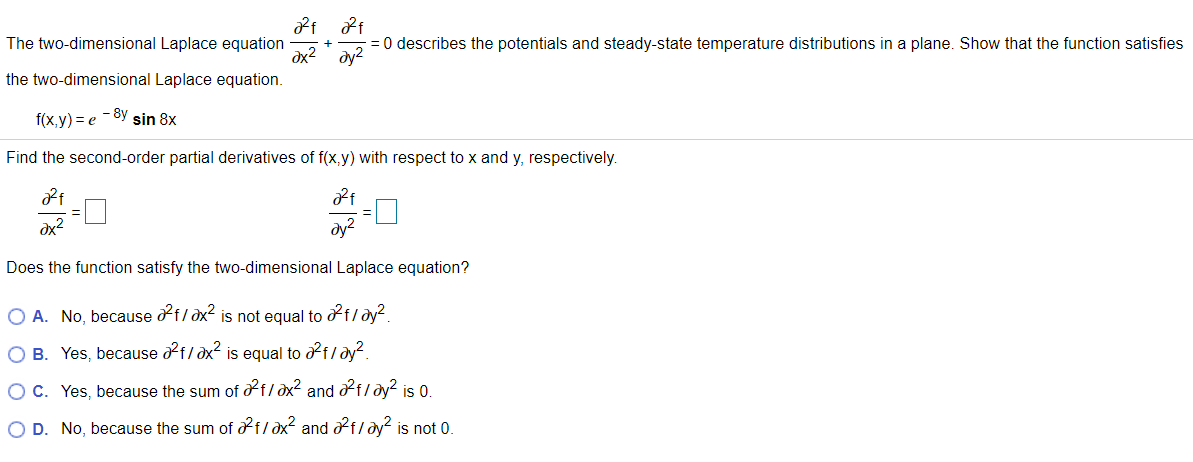The two-dimensional Laplace equation dx2 the two-dimensional Laplace equation. = 0 describes the potentials and steady-state temperature distributions in a plane. Show that the function satisfies + dy f(x,y) = e - 8y sin 8x Find the second-order partial derivatives of f(x,y) with respect to x and y, respectively. dy? Does the function satisfy the two-dimensional Laplace equation? O A. No, because f/dx? is not equal to f/ dy?. O B. Yes, because df/ dx? is equal to df/ dy?. O C. Yes, because the sum of &f/dx? and Zf/ay? is 0. O D. No, because the sum of fi/ax? and f/ dy? is not 0.
The two-dimensional Laplace equation dx2 the two-dimensional Laplace equation. = 0 describes the potentials and steady-state temperature distributions in a plane. Show that the function satisfies + dy f(x,y) = e - 8y sin 8x Find the second-order partial derivatives of f(x,y) with respect to x and y, respectively. dy? Does the function satisfy the two-dimensional Laplace equation? O A. No, because f/dx? is not equal to f/ dy?. O B. Yes, because df/ dx? is equal to df/ dy?. O C. Yes, because the sum of &f/dx? and Zf/ay? is 0. O D. No, because the sum of fi/ax? and f/ dy? is not 0.
Linear Algebra: A Modern Introduction
4th Edition
ISBN:9781285463247
Author:David Poole
Publisher:David Poole
Chapter4: Eigenvalues And Eigenvectors
Section4.6: Applications And The Perron-frobenius Theorem
Problem 69EQ: Let x=x(t) be a twice-differentiable function and consider the second order differential equation...
Related questions
Question

Transcribed Image Text:The two-dimensional Laplace equation
dx2
the two-dimensional Laplace equation.
= 0 describes the potentials and steady-state temperature distributions in a plane. Show that the function satisfies
+
dy
f(x,y) = e
- 8y
sin 8x
Find the second-order partial derivatives of f(x,y) with respect to x and y, respectively.
dy?
Does the function satisfy the two-dimensional Laplace equation?
O A. No, because f/dx? is not equal to f/ dy?.
O B. Yes, because df/ dx? is equal to df/ dy?.
O C. Yes, because the sum of &f/dx? and Zf/ay? is 0.
O D. No, because the sum of fi/ax? and f/ dy? is not 0.
Expert Solution
This question has been solved!
Explore an expertly crafted, step-by-step solution for a thorough understanding of key concepts.
This is a popular solution!
Trending now
This is a popular solution!
Step by step
Solved in 2 steps with 2 images

Knowledge Booster
Learn more about
Need a deep-dive on the concept behind this application? Look no further. Learn more about this topic, calculus and related others by exploring similar questions and additional content below.Recommended textbooks for you

Linear Algebra: A Modern Introduction
Algebra
ISBN:
9781285463247
Author:
David Poole
Publisher:
Cengage Learning

Linear Algebra: A Modern Introduction
Algebra
ISBN:
9781285463247
Author:
David Poole
Publisher:
Cengage Learning